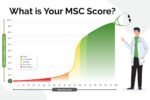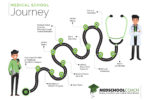
Table of Contents
The Association of American Medical Colleges (AAMC) defines foundational competencies for aspiring medical students. The first list of Premed Competencies for Entering Medical Students was released in 2011. Every few years, they update the list and definitions to reflect the changes in medicine and medical education.
In late 2023, the AAMC made a few significant changes to these competencies that will impact applicants during the 2024/25 cycle. Let’s take a look.
The Purpose of the AAMC’s Core Competencies
As one of the core organizations in the medical education space, the AAMC uses its “Premed Competencies” to put language to what predicts a person’s ability to excel as a medical student and physician.
If you exemplify these qualities, you’re likely a person who can excel in the academic and people-focused steps it takes to be a physician.
Ideally, you’ll show admissions committee members your competencies through a combination of test scores and grades, your extracurriculars, a compelling personal statement, well-structured secondaries, and interviews. (In other words, the medical school application process is designed to identify these competencies.)
What Are the Premed Competencies?
These competencies, as defined by the AAMC, are broken into 3 categories: Professional, Science, and Thinking & Reasoning.
Professional Competencies
- Commitment to Learning and Growth: Always aims to improve oneself and one’s skills. This involves setting clear goals for learning, analyzing both successes and failures, seeking knowledge actively, and using feedback from others to get better.
- Cultural Awareness (new in 2024): Understands that people’s backgrounds, including their history, society, politics, and economy, significantly influence their behavior and well-being. Values and respects diverse cultures and is keen to learn about various beliefs and values.
- Cultural Humility (new in 2024): Openly engages with different viewpoints to better understand them, willingly adapts one’s thinking, and sees situations or ideas from others’ perspectives. This includes self-reflection on personal biases and working towards an inclusive environment.
- Empathy and Compassion (new in 2024): Able to recognize and understand others’ feelings and experiences. Shows sensitivity to others’ needs and a genuine desire to help and provide support in difficult times.
- Ethical Responsibility to Self and Others: Acts honestly and with integrity, balancing various principles and values in decision-making. Maintains ethical standards in professional duties, resists unethical actions, and encourages ethical behavior in others.
- Interpersonal Skills: Aware of how social interactions and behaviors are influenced by various cues. Adjusts one’s behavior accordingly, manages emotions effectively, and treats others with respect and dignity.
- Oral Communication: Skilled in speaking clearly and effectively to others, listens actively to understand others’ intentions, and can overcome communication barriers by adjusting one’s approach or clarifying misunderstandings.
- Reliability and Dependability: Takes responsibility for one’s actions and duties, consistently meets obligations promptly and satisfactorily, and understands the impact of failing to meet one’s responsibilities.
- Resilience and Adaptability: Stays strong and flexible in tough, stressful, or uncertain situations. Adapts to change, learns from difficulties, and maintains a balance between personal well-being and responsibilities.
- Service Orientation: Committed to contributing to the greater good, shows dedication to serving others, and aims to make a positive impact on communities.
- Teamwork and Collaboration: Works well with others to achieve common goals, balances being a team member and a leader, shares information openly, and encourages and accepts feedback to enhance team performance.
Science Competencies
- Human Behavior: Utilizes understanding of oneself, others, and group dynamics to address issues connected to mental, cultural, and physical factors that affect health and well-being.
- Living Systems: Uses expertise in natural sciences to tackle challenges involving both tiny and large-scale systems, ranging from biomolecules and cells to entire organs.
Thinking & Reasoning Competencies
- Critical Thinking: Employs logical analysis to evaluate different solutions, conclusions, or methods for tackling problems, highlighting their strengths and weaknesses.
- Quantitative Reasoning: Uses mathematical concepts and reasoning to understand and explain natural phenomena.
- Scientific Inquiry: Integrates scientific knowledge and methods to gather and interpret information, solve problems, and develop research questions and hypotheses. Proficient in scientific language, contributing to scientific discussions and understanding how scientific knowledge is established and confirmed.
- Written Communication: Skillfully communicates information to others through clear and effective written words and sentences.
Changes to Core Competencies in 2024
In late 2023, the AAMC updated the core competencies for use in the 2024/25 application cycle. Here’s what changed:
- Three categories were added: Cultural Awareness, Cultural Humility, and Empathy & Compassion. Cultural Awareness and Cultural Humility were previously included in the Cultural Competence competency, while Empathy & Compassion was previously part of Service Orientation.
- One category was removed: Social Skills. Factors from the Social Skills section were moved to the new Interpersonal Skills section.
- Teamwork was renamed to Teamwork & Collaboration.
- Capacity for Improvement was renamed to Commitment to Learning & Growth.
- All descriptions were updated to reflect the changing standards in medical education and practice. Among these changes, the most significant were changes related to a move to virtual education and medical practice and the emphasis on diversity, equity, and inclusion in the medical school curriculum.
How This Impacts Your Application
Your medical school application and subsequent secondaries and interviews should all point to these competencies.
But the premed competencies aren’t simply buzzwords to include in your vocabulary when writing a personal statement or describing an extracurricular activity. They are qualities that you should be able to “show, not tell” as a person based on the experiences and education that have made you the person you are today.
Here are a few ideas on how to demonstrate these competencies when preparing your application:
- Take advantage of every opportunity to exemplify your communication skills. Whether by answering questions in an interview or writing a personal statement, communicate in a way that lines up with the role of a physician. Proofread your work. Do mock interviews. Prepare in advance. Do your research. Learn how to be clear, concise, and professional.
- Discuss your growth. In your personal statement, “most meaningful activities” descriptions in Works & Activities, and at your interviews, use storytelling to communicate positive growth. How have you sought out learning opportunities and overcome challenges? What goals have you set, and how did you reach them?
- Demonstrate a commitment to diversity. When possible, talk about experiences where you engaged with diverse communities and cultures. How did you practice an awareness of other cultures and humility to learn more and speak less? Show your understanding of different perspectives and how these experiences shaped how you want to approach medicine.
- Share experiences where your ethics were challenged. Doctors are frequently challenged with muddy ethical scenarios, and you’ll need to show an ability to navigate these situations with grace, wisdom, and compassion. Understand the principles of medical ethics, and share instances in which you properly handled an ethical dilemma.
- Show a desire to practice teamwork, dependability, and a commitment to service. If you’re a person who actually wants to play on the team, stick to your commitments, and serve others, it should be obvious in your application. You can even plan ahead, choosing which extracurriculars will best help you display these qualities on paper.
- Participate in research projects. Not every medical student needs a strong research background, but research is a fantastic medium to show your ability to think and reason well.
- Excel in undergrad and on the MCAT. You know this one already, but your GPA and MCAT score will be a predictor of how you do in med school. They’re one of the only effective ways to demonstrate science competencies, so don’t underestimate their importance.
Unsure of How to Show Your Competencies?
MedSchoolCoach’s Advisors have a combined 500,000 hours helping pre-meds refine their application and get into medical school.
Our students are twice as likely to get into medical school compared to the average applicant. Get started today with a free, no-pressure 15-minute consultation.

Sahil Mehta MD
Dr. Mehta is the founder of MedSchoolCoach and has guided thousands of successful medical school applicants. He is also a practicing physician in Boston where he specializes in vascular and interventional radiology.






